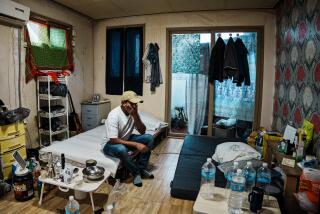Safety Rules Scarce in Chinaâs Factories
LONGHUA, China â Twelve hours a day, seven days a week, He Qun worked at a factory in Chinaâs southeast running a machine the size of a small bus that punched holes in heavy steel sheets.
One day, her arm slipped as she moved one of the sheets. Through the numbing pain, she saw a severed hand fall to the factory floor.
âAll I remember thinking was, âHow did a hand get down there?â â said He, 30. She had neither safety training nor equipment, she said, and was too poor, and her hand too mangled, to get it reattached.
Tens of thousands of Chinese are killed or maimed every year in similar on-the-job accidents -- casualties of their countryâs rise as a manufacturing powerhouse.
Chinese factories, many financed by foreign investors, supply the world with goods from soccer balls to computer chips. But behind the success is a rampant disregard for safety that experts and government officials say makes it one of the most dangerous countries in the world for workers.
The mounting toll of deaths and injuries has grown so severe that Beijing plans to impose Chinaâs first national safety laws Nov. 1.
The new laws replace a patchwork of local regulations. They will require more safety training and equipment, and give authorities the power to arrest owners of dangerous factories.
Behind the carnage, experts and officials point to a range of reasons -- workers exhausted by long hours on outdated machinery, lack of even basic precautions, a ban on independent labor unions that could fight for workplace safety, and reluctance by local officials to crack down for fear of losing jobs or payoffs from factory owners.
âLocal authorities, factory owners, even workers themselves -- no one really cares about safety. They all think the risks are a small price to pay for economic advancement,â said Xu Deshu, an advisor for the State Administration of Safety Production, the government worker-safety agency.
In a report this month, the administration said 6,314 people were killed in industrial accidents in the first six months of this year. Thatâs above the pace of 2001, when 11,047 workers died over the whole year. More than half of this yearâs deaths were at coal mines, where explosions, cave-ins and flooding killed 3,857 people, the report said.
According to experts, the most accident-prone factories are those that make metal and plastic tubes, casings and other components for goods ranging from DVD players to automobiles.
Misreporting and cover-ups by local officials mean that the real death toll from accidents is probably much higher than reported figures, Xu said. He said the report also fails to include deaths from work-related diseases such as lung illnesses from inhaling industrial chemicals or coal dust.
About 10,000 people die every year from such causes, he said.
The current disregard for safety is rooted in the same feature that makes this nation of 1.3 billion such an export power -- its almost unlimited supply of cheap labor.
Workers are so plentiful, and paid so little, that factory owners regard them as easier to replace than machinery, experts said.
Guangdong, a prosperous export center, is one of Chinaâs most accident-plagued areas.
Every year, more than 30,000 workers in the provinceâs more than 1 million factories and small workshops lose fingers or entire limbs in machinery accidents, according to an investigation by the state-owned newspaper 21st Century Business Herald.
Many of those maimed canât find new work and have no disability insurance or other social safety net to fall back on. He Qun hasnât had a job since losing her right hand in 1998. She relies on the charity of friends and family.
She said the factory, a Chinese-Japanese joint venture in the city of Longhua in Guangdong, paid her 3,000 yuan after the accident -- the equivalent of five monthsâ salary, or $350. She said managers told her to go back to her hometown in the poor southwestern province of Sichuan. Since then, theyâve refused to answer her calls and evicted her when she visited.
A spokeswoman for the factory said workers are given adequate safety training. She said she knew of He Qunâs injury but refused to discuss it. Several workers at the factory have been injured in the past, she acknowledged, saying: âMost injuries are caused by their own carelessness.â
He is suing for about $12,500. âFor the rest of my life, I canât do anything,â said He, who has a fourth-grade education. âI canât find work with just one hand.â
More to Read
Sign up for Essential California
The most important California stories and recommendations in your inbox every morning.
You may occasionally receive promotional content from the Los Angeles Times.










